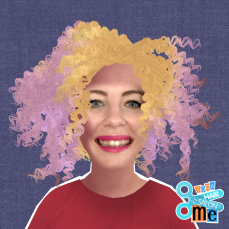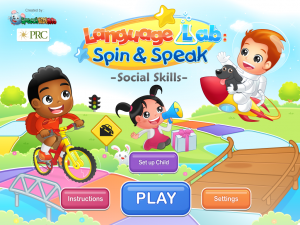
By Emily Gabrielle, AAC Education & Resources Consultant
After 2 years of swearing she wouldn’t be getting anything like this until she was at least 10 years old (I know I’m an idiot) I recently did the unthinkable and bought a tablet for our little girl.
At present the well-known android tablet (or ‘hiPad’ as Cece likes to call it) is only for use in specific situations – such as our frequent trips back and forth over the M62 visiting relatives, when it’s just her and I in the car and, as lovely as it would be, I just simply can’t have her sitting on my knee whilst I navigate the traffic – no matter how loudly she demands this…
The topic of children using tablets is interesting and as much as I can sympathise with the protests of many about we introduce children to them too young or for too long a period at once, the truth is they can offer some amazing language learning opportunities and interactions – especially our emazing AAC users who are learning to use their incredible language and refining their skills.
‘But how do we do this?!’ I hear you cry – well never fear! The fabulous AAC Language Lab UK has some great activity ideas for popular apps (some free but most part of the subscription package) which allow you to model and practice some great language within motivating activities.
If you explore the ‘lesson plans’ section of the site you will see a link to the ‘Mobile Lesson Plans’. Here you will find a great collection of ideas.
These plans are divided into Language Stages identical to those you’ll have seen me explore in my post about classroom resources. For those of you who haven’t checked that post out yet here’s a quick summary…
Language Stages
When thinking about the Mobile Lesson Plans, the AAC Language Lab has divided language development into 3 ‘stages’, which are a compilation of information on language development gathered from a vast number of resources and organised into teachable segments.
AAC Language Lab summarises each stage as follows:
Beginner Stage – Initially using single words for simple language functions building up to short phrases of 2 or 3 words. A vocabulary of up to 200 words.
Intermediate Stage – Initially using phrases of 2 or 3 words building up to longer sentences which have more meaningful word order, increased language functions and increased use of word endings (-in, -ed etc). A vocabulary of 200 to 2000 words.
Advanced Stage – Initially using shorter sentences with appropriate word endings building up to complex sentences with correct word order and grammar. Language development continues as vocabulary expands. A vocabulary of between 2000 and 5000 words (or more!).
So, once you’ve established which language stage your AAC user ‘best fits’ into, go explore the activities which are felt to be appropriate for their language level and have some fun.
 Elf Yourself
Elf Yourself
FLEXIBILITY ALERT! If you see a fun looking activity which DOESN’T correlate to the language stage you are exploring, don’t worry! Have a look at it anyway – see what it suggests, and you can apply some of that lovely creativity to adapt the activity to fit your needs.
 Spin and Speak
Spin and Speak
There’s a fab selection of app ideas on there – perfect to get you lovely parents through the second week of the Easter holidays… and beyond!! So, check it out and let me know which your favourites are.
‘Appy days
There are no comments yet. Be the first to post!You must be logged in to post.
Stories and Strategies fo...










